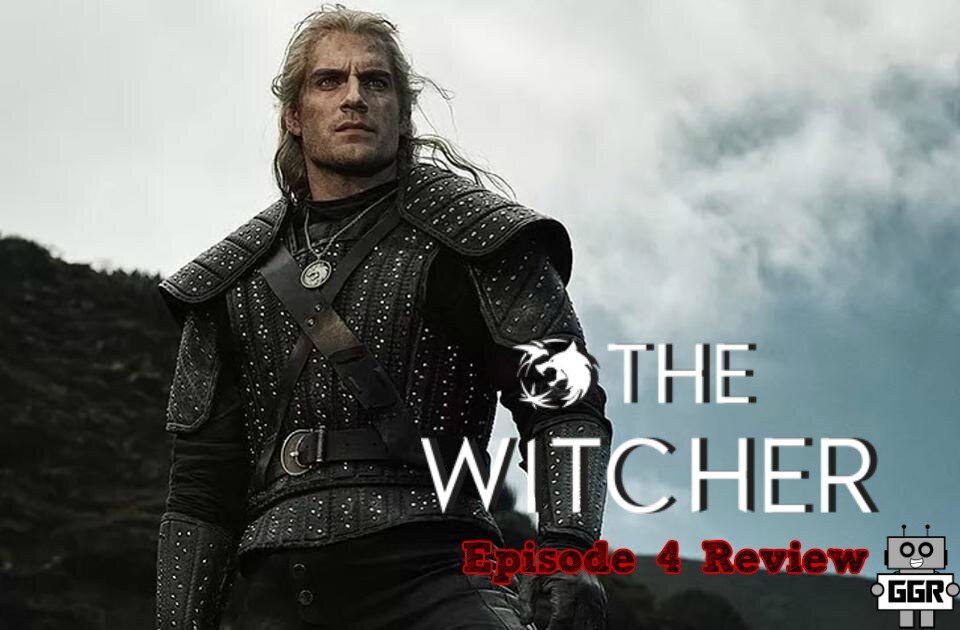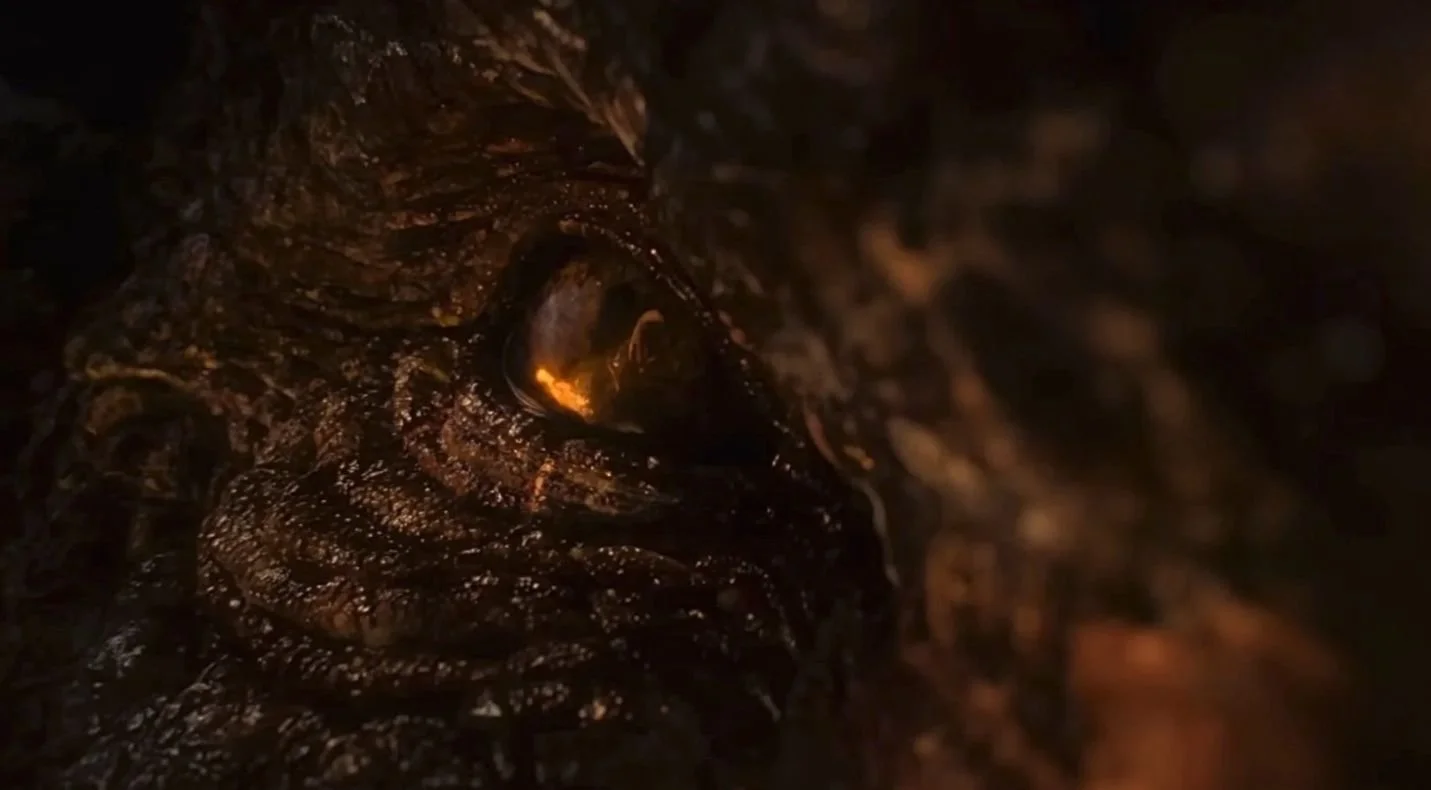The Witcher: Episode 4 Review
by Chelsea House, GGR Contributor
Alright, I’ve got a lot to say about this episode, so let’s just jump into the happenings of this episode first.
CIRI
In this episode we find that Ciri has exited an icy, snow covered world and has entered a green haven. She tries to follow a bright light and is interrupted when she realizes she is surrounded by dreaded, spear wielding, warriors. After she begs them not to hurt her and help her find her friend Dara, she is introduced to the leader of the group (Josette Simon, Blake 7) who informs her she’s in Brokilon forest and they are dryads and Ciri introduces herself as Fiona. They take her to Dara who is alive and rather unhappy as one of the dryads pulls the arrow out and cures his wound with magic water from the forest. The leader tells Ciri that the waters are potent and all new comers must drink it. If they have ill intent towards Brokilon, they die, and if they don’t, the waters help them forget. “I think you’d like that… Am I right… Fiona” the leader says which gives us the idea that she knows a little more than “Fiona” thinks she does. When Dara asks her why they called her Fiona, Ciri then tells him she is Princess Cirilla of Cintra. Dara understandably freaks out a bit with a “Your grandmother slaughtered my family!” Poor Ciri doesn’t believe him until he tells her how the soldiers laughed as they raped and slaughtered women and children. He says he would do anything to forget his past and tells Ciri that she should think for herself when she comments on having to find her destiny. She has a dream of a battle and Cahir and when she wakes she drinks directly from the sap of a magic tree that then causes her to hallucinate or teleport or… something and we are brought to the end of her story with the tree asking “What are you, child?”. I’d like to know the same thing tree.
YENNEFER
When we left off with Yennefer she was brimming with confidence and possibility. When we see her in this episode she is sitting in a carriage next to a Queen and her newborn. The Queen comments on feeling like she is nothing but a vessel for popping out heirs and Yennefer comments on how she had hoped that her last 30 years would have been more than just cleaning up political messes. Their lovely commentary on who is more miserable than the other is cut short by a sword popping through the carriage. Yennefer reviews the situation and puts two and two together that the King, tired of his Queen not producing a male heir (sigh) has sent an assassin to get rid of her and probably the child. Yennefer jumps the queen and her child through multiple portals only to discover that it’s in vain and the assassin is following them through a tracker on the Queen’s body. Said Queen decides this is the best moment to be a diva with a “Get up you useless witch. How could you not forsee this? You’re supposed to protect me!” Um. Rude. This doesn’t sit well with our Yennefer as she’s like “K, Bye,” and creates one more portal in which she leaves alone. After the assassin slits the Queen’s throat, Yennefer jumps through the portal one last time to save the baby and they land on a rather desolate looking beach. She looks down at the babe cradled in her arms and realizes that the teleporting (which caused the Queen to vomit multiple times) was too much and the child is dead.
This cuts us to a scene where she is sitting staring at the ocean, the sun glinting off the distant shores, the water gently lulling back in forth in peaceful waves. The only thing that reminds you of the melancholy is the tiny wrapped bundle. Yennefer then has the conversation that gives me hope that she is a louder beacon than I thought. She apologizes for the child’s loss of life. She then says, “Let’s face it, you’re a girl… Your mother was right about one thing. We’re just vessels. And even when we’re told we’re special, as I was, as you would’ve been, we’re still just vessels. For them to take and take until we’re empty…. So count yourself lucky. You’ve cheated the game and won without even knowing it.” She then gently buries the babe in the dark sands. This scene gave me the depth I was looking for in her character. Here she recounts that it is better for a girl to die than to live the life their world would have for her. She is nothing more than a vessel to produce more men, and when she doesn’t do that, she is nothing at all. Her shivering sigh during this conversation was filled with the weight of what seemed like possible layers for her character. After all, she can’t have children, so even as a powerful sorceress, does she still view herself as nothing? Does her cold, but touching conversation with this child remind her of the weight and force of a completely unfair society that she has little to no ability to change, even with all of her magic. Does this scene remind her that in all of her glory, her beauty, her power, her promises of a bright future, that she is still so very small and so very not in control of what fate will have of her. Often times when we sit in front of an ocean, it reminds us of the reality that we are so very tiny in this huge world. I wonder if that wasn’t placed on purpose. This ends our time with Yennefer this episode.
GERALT
What an onion to peel on this story line. I will admit I had to do some homework on this one. So, we are opened with a man at a pub telling his friends of Geralt hunting a monster and being swallowed whole. Jaskier, reassures the people that Geralt is fine, and even as the townsfolk argue, Geralt busts in covered in blood and guts. Yum. This then brings us to a bathtub scene. As Jaskier comically throws epson salts into the waters, he tells Geralt that he has to attend a ball and due to his inability to keep it in his pants with the married ladies, he needs Geralt as his bodyguard. Geralt states he doesn’t meddle in the “petty squabbles of men” and Jaskier is like, umm but you do. Which leads us to the royal marriage ball!
This scene concretes the fact that we are definitely looking at some different timelines as we are reintroduced to a now dead Queen Calanthe of Cintra and she is holding a marriage ball for her daughter Princess Pavetta (Gaia Mondadori making her television debut), Ciri’s mother. I’m going to do my best to keep this short and just hit the important things as this story line is fairly loaded. Geralt is prevented from laying low when a younger and louder Moussesack (Adam Levy, Supergirl) calls him out from the crowd pretty much the moment he and Jaskier walk in. Queen Calanthe comes bursting in bloodied from a fresh battle with a smile of victory on her face. She had to remind some people “who was queen.” She then changes and we see her sitting with Geralt on one side and Pavetta on the other. They share some “pleasantries” about his outfit and small talk until a Lord Peregrine of Nilfgaard approaches to explain why he deserves Pavetta’s hand. Not only does the crowd mock him, the Queen herself says some pretty nasty things and he gets laughed out of the room (I’ll go into this a little later). We then discover that she is only having this whole ball because “male tradition demands it.” Calanthe sneers, and we get the idea that she might even like for Pavetta to choose for her own. Be careful what you wish for Queenie.
We see a helmeted knight burst in and try to claim Pavetta’s hand. He announces himself as Lord Urcheon (Bart Edwards, State of Happiness). The Queen gets all pissed that he’s wearing a helmet, he says he can’t remove it (how very Mandalorian of him), and Eist is all like eff that and knocks the helmet off. We see now a half man half… hedgehog? The Queen demands Geralt kill him, Geralt refuses saying he is not a monster, but a cursed man. She doesn’t care and demands that he be slain. Lord Urcheon then states Pavetta is rightfully his by The Law of Surprise (I’ll also go into this later). There is mumbling, tension, and then swords being drawn. He gives it his best until he’s knocked on his back. A knight raises his axe and just when you think the Queen’s troubles are over, our Witcher jumps in, slices the ax and begins to fight with Hedgehog Knight. There is yet another beautifully choreographed fight scene (something The Witcher get’s a A+ from me for) until the Queen grabs a sword, locks blades with Geralt and demands everyone to stop.
We discover that A) Pavetta loves Lord Urcheon and calls him Duny (And I will as well) and B) Duny saved King Roegner from death when he was a boy and “by tradition” claimed The Law of Surprise. We understand from Eist’s explanation, “It’s an honest gamble. As likely to be rewarded with a bumper crop or a newborn pup. Or a child of surprise…. Destiny has determined that the surprise be Pavetta.” Duny then states he never meant to claim her. He knew she couldn’t love him the way he looked, but as Eist stated, Destiny had already determined. There is some more dialogue but the most important line is Mousesack stating, “Honour destiny’s wish, or unleash it’s wrath upon us.” letting us know how heavily respected The Law is.
Geralt gets a chance to say he doesn’t really believe in destiny, however a promise is a promise. The Queen responds to all of this by trying to stab Duny, who is saved when Pavetta screams and unleashes a whirlwind on everyone, destroying the room in the process. Geralt and Mousesack combine their powers and stop Pavetta. As her and Duny gather themselves, Geralt and Mousesack share a knowing and awestruck look. The Queen is obviously shook up and Eist states, “Do you believe in destiny now?” The Queen slowly walks over to Pavetta, hugs her, “I thought your grandmother’s gift had skipped you, as it did me.” So we also learn this scream ability (what else do I call it at this point?) is hereditary. Calanthe has a change of heart and decides to marry Duny and Pavetta, and also announces her engagement to Eist. Duny, who after the wedding is now transformed into a handsome devil, is grateful to Geralt for saving his life and begs him to let him repay him. So geralt begrudgingly “continues tradition” and claims The Law of Surprise. The Queen is NOT pleased by this, and as Geralt is all like, “It’s fine”, Pavetta throws up, the Queen realizes she’s with child (Ciri), and Geralt gets a pretty mixed and judgy look from everyone to which he responds with a charming “F***”. So we now know how Geralt is tied to Ciri!
As Geralt tries to leave, Mousesack tells him to stay and fulfill the destiny, Geralt reminds him he doesn’t care about destiny, and Mousesack gives us a foreboding reminder of how, if Geralt just leaves, he will “surely unleash calamity” on them all. Geralt pretty much is like *shrug*, leaves, and that ends his story for this episode. (whew)
There is a random scene at the end where we are back at Cintra with Cahir of Nilfgaar and his Sorceress Frangilla standing over a dead Calanthe. A random guy cuts a rectangle of skin out of Calanthe’s arm, eats it, convulses, is gutted by Frangilla who then reads his entrails and somehow knows that Ciri is in the Brokilon forest. Okay first off… so much gross. Second off, couldn’t she just read some tea leaves or something? I mean… crystal ball even? Like why the dramatics. Anywho, this is how Episode 4 ends.
My thoughts?
1: I’m not going to lie, I had to rewatch the ball scenes two times to understand the whole Law of Surprise thing, and then even read up on it a bit. So pretty much the Law is that if person A saves person B, they claim the Law, and the first “surprise” that happens in person B’s life is now person A’s which is why Eist says it’s a gamble. I really wish they would have explained that just a little bit more, maybe like a side dialogue about it or something. Hopefully I wasn’t the only one confused by all of this, but if so, that’s fine too.
2: The time jumps are a little jolting thus far. I don’t think it would have killed them to do a “30 years prior”, “present”, or “10 years prior” warning like everyone else. This was the first episode I was able to understand the timelines a little more clearly, but still, the warning would’ve made the viewing a little more pleasant.
3: Queen Calanthe’s degrading remarks to Lord Peregrine of Nilfgaard, I believe, begins her demise. I hope the show takes us through how Nilfgaard goes from being a laughable part of the world to a place that can destroy the all powerful Cintra.
All in all, I am enjoying The Witcher so far. There are times where I am a bit lost, but overall the world building and sword and sorcery are entertaining enough to keep me watching.
Stay tuned for our episode 5 and 6 reviews by Benjamin Shapiro!
















EIC Mike Lunsford gives his review and commentary on the HBO Max documentary “Pee-wee as Himself.”